The tagline reads, "Warning: This Movie Could Save Your Life." A little presumptuous right? In reality, this movie can save your life if you let it. We've come a long way in the medical world. There's medicine for every illness out there yet we're sicker than ever. Why? What no one tells us is how the foods we are eating are giving us heart disease, diabetes, and cancer. It's a known fact that fruits and vegetables are good for you but we don't know just how important they are to our physical health. We also have been taught to believe that things like animal meats and dairy products are essential to a healthy lifestyle. What we don't know is that nothing is further from the truth.

"Forks Over Knives" A Movie Review
The foods we are eating are giving us heart disease, diabetes, and cancer. The answer to reversing our ailments is so simple: change your diet, change your life.
Forks Over Knives
"The film, which received rave reviews from medical experts and ... around the world and has become one of the most influential documentaries of our time."
"Forks Over Knives" is a 2011 American documentary film directed by filmmaker Lee Fulkerson that supports a whole-food, plant-based diet to fight a number of diseases. The movie claims "most, if not all, of the degenerative diseases that afflict us can be controlled, or even reversed, by rejecting our present menu of animal-based and processed foods."
The "stars" of the film are American physician Caldwell Esselstyn and professor of nutritional biochemistry T. Colin Campbell. We follow Lee Fulkerson on his journey to find out if eating a primarily whole-foods diet really is the healthiest way to live. He changes his own eating habits and interviews doctors Esselstyn and Campbell, as well as others who have tried this "radical" lifestyle.
But why is this considered such a radical and extreme lifestyle? For thousands of years, people lived off the land. Factory foods and fast food chains are just a modern day invention. In recent years, we've seen the highest recorded deaths from heart disease and cancer and yet, many people are blind to the correlation. Nearly half of the nation will undergo bypass surgery directly caused by the unhealthy foods we are eating. The documentary forces us to ask ourselves which one seems to be more extreme?
Rent "Forks Over Knives" for only $2.99
 |
| Forks Over Knives Only $2.69 |
Healthy Eating is NOT a Matter of Will Power
We see obesity everyday. The general population is overweight. The average woman is a size 14 and the average man is 27 pounds overweight. The rest of the world sees us as lazy slobs who choose to be this way. We just don't care about our health and eat whatever we can shove in our mouths.
FALSE. The doctors interviewed in Forks Over Knives explain how artificial and processed foods react to our body.
 First, the brain. We are literally addicted to the foods we eat. Our brains recognize food as a pleasure. They compare this to sharks. Their instinct is to eat and mate. We'd like to think we're more evolved than sharks but when it comes down to it, we have the same instincts.
First, the brain. We are literally addicted to the foods we eat. Our brains recognize food as a pleasure. They compare this to sharks. Their instinct is to eat and mate. We'd like to think we're more evolved than sharks but when it comes down to it, we have the same instincts.
 Second, our stomachs. Ever wonder why we can feel so full after a small salad but we're still hungry after a Big Mac? It's science. The film explains how when we eat, we have nerves that tell our brain we're full. When eating foods that are bodies are designed to handle (fruits/vegetables/nuts/grains) it's easy for our stomachs to tell our brains we are full. When we fill up on artificial foods and oils, our sensors don't pick them up as quickly as natural foods. Therefore, we're full but don't feel full.
Second, our stomachs. Ever wonder why we can feel so full after a small salad but we're still hungry after a Big Mac? It's science. The film explains how when we eat, we have nerves that tell our brain we're full. When eating foods that are bodies are designed to handle (fruits/vegetables/nuts/grains) it's easy for our stomachs to tell our brains we are full. When we fill up on artificial foods and oils, our sensors don't pick them up as quickly as natural foods. Therefore, we're full but don't feel full.
Correlation Between Milk and Cancer
Milk was thought to be natures perfect food. In the early decades of the 20th century, people were told to put babies on pure cows milk immediately after weaning them off of breast milk. A number of years later, children were developing liver cancer, stunning medical doctors around the world. This quickly opened studies to try to find out why children were getting liver cancer. What doctors discovered was so simple, it was mind blowing: milk was causing cancer.
80% of cows milk is made up of the protein, casein. They discovered that, like in most foods, a little is okay but too much can kill you. They came up with this when studying rats. They isolated casein in cows milk and fed 20% of it to a group of rats. Another group of rats were given 5% casein. They found that all of the 20% rats developed cancer, while none of the 5% rats got sick.
Why is Meat so Bad for us?
According to ForksOverKnives.com: "We can add another reason to the list of why we should not eat meat. If the saturated fat and cholesterol in meat were not enough, there is a newly identified toxic kid on the block: trimethylamineoxide (TMAO).
When we eat red meat, its carnitine interacts with our gut bacteria, forming trimethylamine, which is then metabolized by the liver into TMAO. And it appears that TMAO is not our friend.
TMAO promotes the formation of cholesterol plaques in our blood vessels, which make them less healthy and may lead to heart attack, stroke, and death. TMAO reduces our body’s ability to excrete cholesterol.And, if that is not bad enough, TMAO may be linked to death from prostate cancer.
The good news is that people who eat an exclusively plant-based diet appear to form little TMAO. In fact, when researchers fed steak to a vegan, virtually no TMAO was made.Why is that? Vegans, it seems, do not select for the specific gut bacteria that lead to the formation of TMAO, whereas meat eaters do. Hence, it’s as if plants create a coat of armor in our stomachs, protecting us when they are not even there."
So why are meats and dairy pushed on us? Profit. The movie explains how politicians in charge of choosing things like meals for school kids, each had a connection with some food brand. They push the brand, they make more money.
"There is no money in healthy people or dead people. The money is in sick people." -Bill Maher
- The graph below shows the relationship between animal by-product intake and cancer & heart disease mortality rate:

The China Study
"The China Study follows the work of Dr. T. Colin Campbell, from his decades of laboratory experiments on protein consumption, to The China Project, referred to as the "Grand Prix of epidemiology" by The New York Times. The China Project examined more than 350 variables of health and nutrition with surveys from 6,500 adults in more than 2,500 counties across China and Taiwan, and conclusively demonstrates the link between nutrition and heart disease, diabetes, and cancer." -ForksOverKnives.com
The China Study looks at the relationship between the eating animal products and chronic illnesses including heart disease, diabetes, breast cancer, prostate cancer, and bowel cancer.
The book is loosely based on the China-Cornell-Oxford Project, a 20-year study that looked at mortality rates from cancers and diseases from 1973–1975 in 65 counties in China; the data was correlated with 1983–1984 dietary surveys/blood work from 100 people in each county. The study showed that counties with a high consumption of animal-based foods in 1983–1984 had higher death rates from "Western" diseases as of 1973–1975, while the opposite was true for counties that ate more plant foods.(wikipedia)
 |  |  |
| The Campbell Plan: The Simple Way to ... | The China Study Only $14.0 | Whole: Rethinking the Science of Nutr... |
How You Can Get Healthy
The diet advocated in "Forks Over Knives"
By simply replacing red meats and processed foods, we can give ourselves a higher chance of avoiding heart disease, cancers, and diabetes.
"A whole-food, plant-based diet is centered on whole, unrefined, or minimally refined plants. It’s a diet based on fruits, vegetables, tubers, whole grains, and legumes; and it excludes or minimizes meat (including chicken and fish), dairy products, and eggs, as well as highly refined foods like bleached flour, refined sugar, and oil." -ForksOverKnives.com
"Forks Over Knives" Official Trailer
Rent or Own "Forks Over Knives"
 |  |
| Forks Over Knives | Forks Over Knives Only $2.69 |
For more information, visit the Forks Over Knives website, which includes success stories, the FOK diet, recipes, and more.
You might also like
Understanding and Living with Lactose IntoleranceWhat is Lactose Intolerance? Is it a food allergy or digestive disorder? Why ...
Why I Shaved My HeadA month ago I shaved my head to support cancer patients and raise money for R...
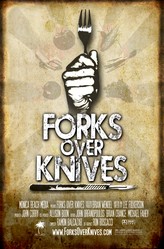

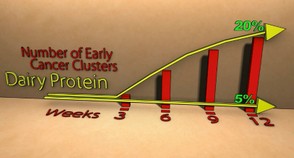
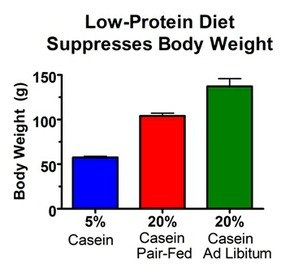




 "Lone Wolf" Book Reviewon 01/02/2015
"Lone Wolf" Book Reviewon 01/02/2015
 Kaits Creations on Zazzleon 12/08/2014
Kaits Creations on Zazzleon 12/08/2014
 The Vegetarian Chronicles; Part 4: The Finaleon 11/03/2014
The Vegetarian Chronicles; Part 4: The Finaleon 11/03/2014
 The Korowai Cannibalson 10/24/2014
The Korowai Cannibalson 10/24/2014
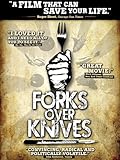
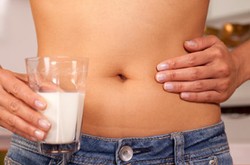
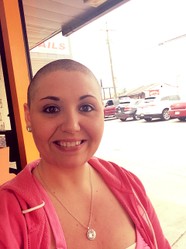
Comments
I can't remember it word-for-word but there is part of the film where they talk about how money controls what foods we're being encouraged to eat and how much profit is made from all of the medications we're on for things like high blood pressure, cholesterol, diabetes, etc. Then again it also strains our healthcare system when people are needing bypass surgery and other operations related to our poor eating habits. It's a cycle and it continues because it's not taken serious enough and the rich continue to get rich from all their deals with different food companies- not to mention those who own fast food chains. (This is from me, not the film) They make enough to dine at 5 star restaurants while the food they're distributing is killing people, plus those who work for them can barely provide for their families. It's such a screwed up system. You're absolutely right- everything relates back to money.
These days there is no excuse for ignorance when it comes to eating poorly. Information is everywhere, but most people don't want to change the way they eat so they ignore the facts, until they get sick. I absolutely agree with Bill Maher's statement that there is no money in healthy people. The more you learn, the more your eyes will be opened to the way things work in this world, and it's all related to money.
Meat is easy for me to stay away from but I think the occasional hot dog will be hard to avoid, although I'm sure it's one of the worst things to eat. I was really amazed at this film. It's general knowledge that fruits and veggies are better for you but there's so much detail and and they explain the science of it, it's really well put together.
This is an excellent video. I have watched it twice. My husband can easily go without meat, but for me, I have to have some and get only grass fed beef and chicken that has had no antibiotics, hormones, etc., etc. given to them or added to their food. I don't eat a lot of meat though. Great review!